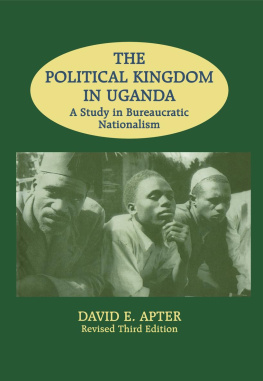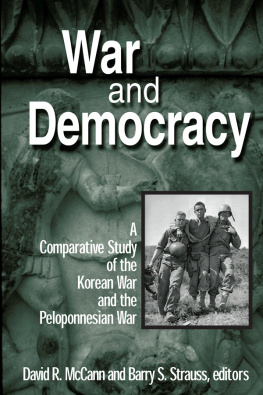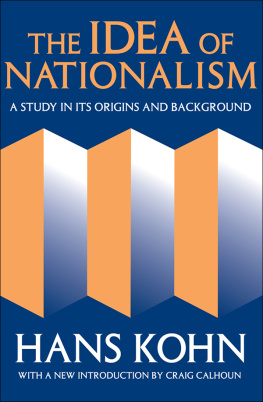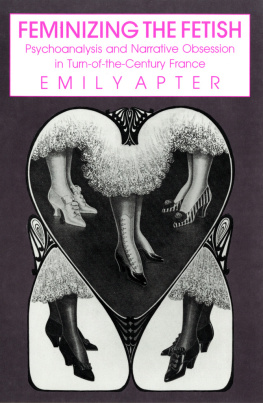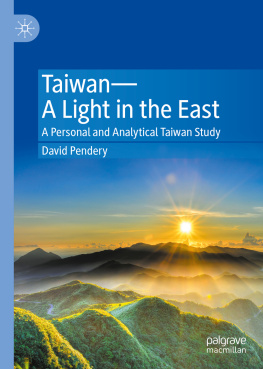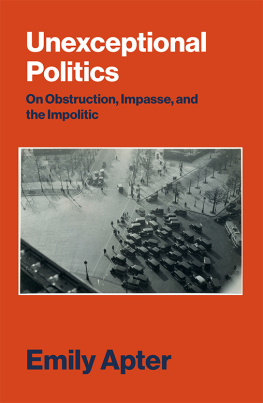THE POLITICAL KINGDOM IN UGANDA
The Political Kingdom in Uganda
A Study of Bureaucratic Nationalism
David E. Apter
First Published in 1961 by Princeton University Press This edition first published in 1997 in Great Britain by
Routledge
2 Park Square, Milton Park, Abingdon, Oxon, OX14 4RN
and in the United States of America by
Routledge
270 Madison Ave, New York NY 10016
Transferred to Digital Printing 2006
Website http://www.routledge.com
Text Copyright 1961, 1967 David E. Apter Introduction Copyright 1997 David E. Apter
British Library Cataloguing in Publication Data:
Apter, David E. (David Ernest), 1924-
The political kingdom in Uganda: a study of bureaucratic nationalism. 3rd e
1. Uganda - s andt
I. Title
967.6'104
ISBN 0-7146-4696-2 (cloth)
ISBN 0-7146-4234-7 (paper)
Library of Congress Cataloging-in-Publication Data:
Apter, David Ernest, 1924-
The political kingdom in Uganda: a study of bureaucratic nationalism / David E. Apter.
p. cm.
Includes bibliographical references and index.
ISBN 0-7146-4696-2 (cloth). ISBN 0-7146-4234-7 (pbk.)
1. Buganda Politics and government. 2. Uganda Politics and government. I. Title.
JQ2951.A99B843 1997
306.2'09676dc21
97-13495
CIP
All rights reserved. No part of this publication may be reproduced in any form or by any means, electronic, mechanical, photocopying, recording or otherwise, without the prior permission of Frank Cass and Company Limited.
Publisher's Note
The publisher has gone to great lengths to ensure the quality of this reprint but points out that some imperfections in the original may be apparent
To Andrew
Contents
Maps
(The maps on pp.33, 51, and 52 are from The Economy of East Africa: A Study of Trends [London: Economist Intelligence Unit, 1955]. Reprinted with permission.)
Photographs
Plates follow page 174
All photographs not credited to the British Information Services were taken by the author
IN 1955, when the first of these studies was written on the development of modern nationhood in Ghana, the model for African political development was found in the institutions and practices of government in the West. Today, Ghana is herself a model for other countries. Leaders of nationalist movements elsewhere in Africa have turned to Ghana as the exemplar, hoping to learn from her successes how best to develop the new nations of Africa, and hoping to learn from her mistakes some of the more likely pitfalls of independence. Ghana's independence was thus a landmark in the political emancipation of Africa. It is unlikely that without her independence neighboring territories, particularly in former French West Africa, would be proceeding to self-government.
Just as Ghana is now a model for other countries, so has Ghana helped African leaders elsewhere to turn their attention inward to the continent itself. They are anxious to create new African communities. The Pan-African Freedom Movement of East and Central Africa is one such effort to unify the diverse peoples of those areas into wider, more effective political communities. Symbolic of this turning inward for inspiration are the concepts of African personality and negritude. Both are efforts to comprehend the unifying genius of a whole people in both its particularities and its universal contributions to man's cultural heritage.
Uganda shows a very different pattern of development from the one which occurred in Ghana. Not only does it represent a fundamentally different system of traditional authority, but, when the political leaders of Africa contemplate Africa's future, Uganda will be one of the more puzzling and difficult countries to understand. In Ghana, for example, the forces of tradition and ethnicity arrayed themselves unsuccessfully against the more secular growth of a modern nationalism devoted to sweeping change. In Uganda, and most particularly in Buganda, there has been, in sharp contrast, a traditionalization of change itself. Indeed, it is this latter phenomenon which lies at the root of Uganda's political troubles today. Nationalism has been aggressive but ethnically parochial. Not anxious for wider and more sweeping political amalgamations, the people of Buganda represent a problem for secular nationalists both in Uganda and elsewhere in East Africa.
Thus the problems of Uganda are interesting not simply from a theoretical point of view. They represent too a phenomenon in Africa which has been much overlooked as the successes of secular nationalism have naturally focused our attention upon anti-colonialism. Uganda raises the question of what shall remain when colonialism departs. What are the stubborn and persistent forces of an accommodated traditionalism which will remain in the new Africa, to be absorbed or not as time and wisdom decree?
Both Ghana and Uganda are part of a restless continent. strenuous efforts are being made to create new political units released from the boundaries imposed during the colonial period. New nations are being born and with their birth there is an anticipatory spirit of renascence which has brought a search for cultural meanings intrinsic to the African scene, yet universal in their message for modern man.
What Ghana and Uganda have in common and indeed share with other African countries is their desire for freedom. All colonial territories regard the political kingdom as the passport to other kingdoms: those which harbor racial dignity and stature and by means of which the hunger to be free of social discrimination and invidious slurs on culture and history can be satisfied. Behind the struggle to end colonialism is not only the Africans' demand for political power, but the beginning of a new freedom from the stigma of race.
In this respect all African nationalism reflects the wider significance of the changes undertaken in Africa today. The problem of our generation is the elimination of race as significant in evaluating men. The eighteenth century was a battle for political freedom and individualism. The nineteenth emphasized economic equality and opportunity. The present century is a struggle for racial equality. Because racial discrimination has restricted both economic equality and personal liberty, the struggle for racial equality inevitably involves the other two. Events in Africa thus have a moral dimension which is fundamental to our age, and which brings the struggle for political freedom in Africa close to the social problems which engulf our own nation.
Bearing in mind these wider concerns of African nationalism, we can now turn to Uganda. The present study focuses primarily on the most important political group in Uganda, the people of Buganda. By their special relationship with British authorities as well as their devotion to their own institutions, these people have successfully prevented a wholesale assault on their ethnic autonomy. Neither colonial officials nor nationalists have been successful in whittling away the autonomous position of Buganda within Uganda or within a larger context of East African nationalism.
In doing this study I have sought help in many quarters. In all cases it has been freely given. The year 1955-1956 which I spent in Uganda included some of the more dramatic episodes in the recent history of Uganda. It was the year in which the Kabaka af Buganda returned from exile to become a constitutional monarch. Although it was a difficult time in the relationships between British and Africans, nevertheless the cooperation necessary to complete my research was unfailingly offered with great courtesy and hospitality. My first acknowledgment is to the former Governor of Uganda, Sir Andrew Cohen, whose wisdom and talents cannot be dimmed by the unfortunate crisis in Uganda which marred an otherwise brilliant administration. He provided me with access to the materials and men necessary for me to carry on my work; and insofar as it was in his power to do so, he turned over to me the intellectual keys to the kingdom.

